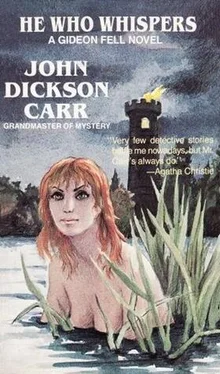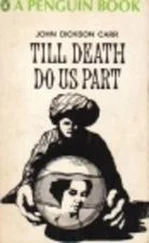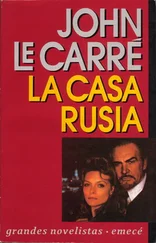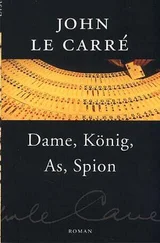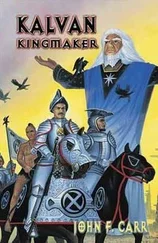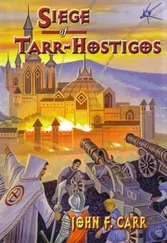“I questioned Miss Seton last night,” he continued, “and I hinted. Today I propose to question her without hints. But I fear it won't be any good. The best thing to do is perhaps to get in touch with Miss Barbara Morell . . .”
“Wait a minute!” Miles rose to his feet. “We've got in touch with Barbara Morell! She rang up here not five minutes before you came in!”
“So?” observed Dr. Fell, instantly alert. “What did she want?”
“Come to think of t,” said Miles, “I haven't the remotest idea. I forgot to ask her.”
Dr. Fell eyed him for a long moment.
“My boy,” Dr. Fell said with an expansive sigh, “it is more and more borne in on me that you and I are spiritually kin. I refrain from making frantic comments; that is the sort of thing I always do myself. But what did you say? did you ask her about Jim Morell?”
“No. Steve Curtis came in just then, and I didn't have time. But I remembered you said it might help us to get the information, so I've arranged to see her today in town. I might as well,” Miles added bitterly. “Dr. Garvice is getting a nurse for Marion, an everyone claims I'm in the way in addition to being the pigheaded swine who introduced the disturbing element into the house.”
Miles was getting lower and lower, blacker and blacker, in his mind and spirit.
“Fay Seton's not guilty!” he shouted; and he might have gone on to enlarge on this if Dr. Laurence Garvice himself, with a bowler hat in one hand and a medicine-case in the other, had no put his head in at the doorway to the reception hall.
Dr. Garvice, a middle-aged, pleasant-faced man with a grizzled head and a scrubbed antiseptic manner, obviously had something on his mind. He hesitated before coming in.
“Mr. Hammond,” he said, giving a half-smile to Miles and Dr. Fell, “before I see the patient again, I wonder if I could have a word with you?”
“Yes, of course. Don't hesitate to speak in front of Dr. Fell.”
Dr. Garvice closed the door behind him and turned round.
“Mr. Hammond,” he said, “I wonder whether you would mind telling me what frightened the patient?”
Then he held up his hand with the bowler hat.
“I ask,” he went on, “because this is the worst case of plain nervous shock in my experience. That's to say: there's often, nearly always, severe shock attendant on physical injury. But there's no physical injury of any kind.” He hesitated. “Is the lady of a highly strung type?”
“No,” sad Miles. He felt his throat contract.
“No, I shouldn't have thought so myself. Medically she's as sound as a bell.” There was a little pause, faintly sinister. “Apparently someone tried to get at her from outside the window?”
“That's the trouble, Doctor. We don't know what happened.”
“Oh, I see. I was hoping you could tell me.--There's no other sign of . . . burglars being here?”
“None that I've noticed.”
“Have you informed the police?”
“Good God, no!” Miles blurted this out, and then steadied himself to casualness. “You can understand, Doctor, that we don't want the police mixed up in this.”
“Yes. No doubt.” With his eye on the pattern of the carpet, Dr. Garvice slowly tapped his bowler hat against his leg. “The lady doesn't suffer from—hallucinations?”
“No. Why do you ask?”
“Well,” and the physician lifted his eyes, “she keeps on muttering, over and over, about something whispering to her.”
“Whispering?”
“Yes. It rather worries me.”
“But 'whispering,' someone whispering to her, couldn't have caused . . .?”
“No, Exactly what I thought myself.”
Whispering . . .
The eerie word, with its sibilant note, seemed to hang in the are between them. Dr. Garvice still tapped his bowler hat slowly against his leg.
“Well!: He woke up and looked at his wrist-watch. “I dare say we shall find out soon enough. In the meantime, as I told you last night, there's nothing to worry about. I was lucky enough to get a nurse, who's outside now.” Dr. Garvice turned towards the door. “It's very disturbing, though,” he added. “I'll look in again when I've seen the patient. And I'd better look in on the other lady too—Miss Seton, isn't it? She didn't seem, last night, to have as much blood-colour in her as she should have. Excuse me.”
And the door closed after him.
Chapter XIII
“I suppose,” Miles remarked mechanically, “I'd better go and see about breakfast for all of us.” But he took only two steps toward the dining-room. “Whispering!” he said. “Dr. Fell, what is the answer to all this?”
“Sir,” returned Dr. Fell, “I don't know.”
“Does it give you a clue of any kind?”
“Unfortunately, no. The vampire—”
“Need we use that word?”
“The vampire, in folk-lore, whispered softly to her victim at the beginning of the influence that threw the victim into a trance. But the point is that no vampire, real or faked, no sort of imitation bogy at all, would have had the least effect on your sister. That is correct?”
“I'd swear to it. Last night I gave you an instance to prove it. For Marion”--he tried to find the right words--”such things just didn't enter her mind.”
“You'd call her completely unimaginative?”
“That's a strong word to use about anybody. But certainly she's completely contemptuous of that. When I tried to talk to her about the supernatural, she made me sound foolish even to myself. And when I talked about Count Cagliostro . . .”
“Cagliostro?” Dr. Fell blinked at him. “Apropos of what? Oh, ah! I see! Rigaud's book?”
“Yes. According to Fay Seton, Marion seems to have got a quite sincere if hazy idea that Cagliostro was a personal friend of mine.”
Dr. Fell's scatterbrain had been set off again. He leaned back in the chair, his pipe gone out, and dreamily contemplated a corner of the ceiling for so long a time that Miles thought he must be a victim of catalepsy until Miles saw the far-away twinkle which began in the doctor's eyes, the vast sleepy beam which overspread his face, the series of chuckles which gradually ran up the ridges of his waistcoat.
“It's a fascinating subject, you know,” mused Dr. Fell.
“Vampires?” said Miles bitterly.
“Cagliostro,” replied Dr. Fell.
He gestured with the pipe.
“Now there is a historical character,” he continued, “whom I have always detested and yet obscurely admired. The tubby little Italian, the eye-roller, 'Count Front-of-Brass,' who claimed to be two thousand years old from drinking his own elixir of life! The wizard, the alchemist, the healer! Moving across the screen of the late eighteenth century in a red waistcoat covered with diamonds! Aweing kings' courts from Paris to St. Petersburg! Founding his cult of Egyptian Masonry, to which women were admitted, and addressing his female disciples with everybody in puris natuarlibus! Making gold! Prophesying the future! And, incredibly, getting away with it!
“The man was never exposed, you remember. His ruin came about through the business of Marie Antoinette's diamond necklace, in which the count had no concern whatever.
“But I think his most intriguing exploit was his Banquet of the Dead, at the mysterious house in the rue St. Claude, where the ghosts of six great men were gravely summoned from the shadows to sit down at dinner with six living guests.
“'At first,' writes one biographer, 'conversation did not flow freely.' This seems to me one of the classic understatements. My own conversation would have dried up, would positively have petrified, if I found myself at a dinner-table requesting Voltaire to pass the salt or asking the Duc de Choiseul how he liked the quality of the spam. And at this dinner the ghosts themselves seem to have been rather embarrassed as well, to judge by the quality of their talk.
Читать дальше
